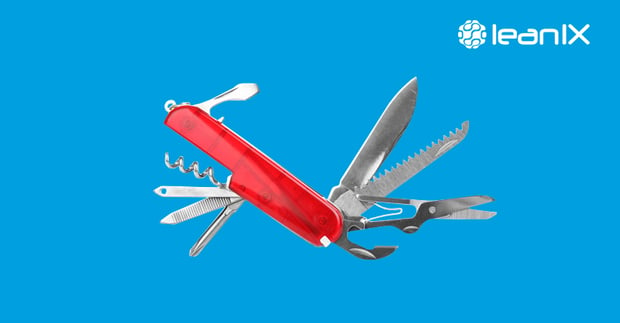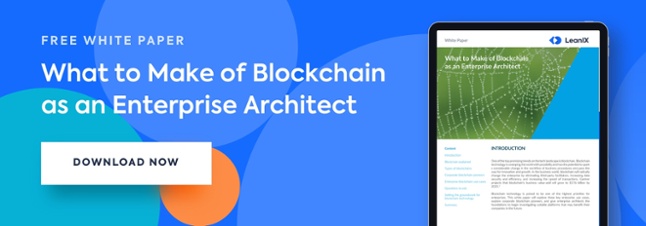
In the previous installment, we have explained blockchain and its supporting components. In this article, we will cover enterprise blockchain use cases, and the critical questions to ask before implementation.
ENTERPRISE BLOCKCHAIN USE CASES
A major challenge for enterprises is to see clearly through the hype around blockchain technology, sift through the use cases, and look for a possible fit. This is where an enterprise architect’s holistic view of the enterprise will come in handy. Organizations must ask themselves what their role in the blockchain world will be and, from there, devise an integration plan. Adoption to blockchain should be a gradual and steady venture with significant contributions by the enterprise architect.
1. Supply Chain Management
Digitization has caused many industries to revisit their supply chain processes. Industry 4.0 requires supply chains to become more precise, faster, and more agile. At each step of the supply value chain, from the extraction of raw materials to the customer, blockchain technology can be used to store and record all the transactions and exchanges of ownership. It will be easy to tell where materials are sourced, which type of labor was used, and the exact position of the good at any given moment.
In the supply chain management use case, blockchain technology enables companies to:
- Verify materials and how the materials were created (e.g., child labor, slave labor, or reputable methods).
- Identify asset quantity as the assets move through the supply chain.
- Coordinate orders and shipment notifications.
- Verify the constitution of materials.
- Increase scalability, security, and innovation.
- Link physical materials to serial numbers, barcodes, and digital tags.
- Share important information about the manufacturing process, assembly, delivery, and vendors.
Provenance is building a traceability system for materials and products using a new type of data system based on a blockchain. The blockchain base serves a data system for securely storing information - inherently auditable, unchangeable, and open. The UK’s largest consumer co-operative, The Co-op, uses Provenance software to track fresh produce and their product claims from origin to supermarket.
2. Healthcare Data Regulation
Organizations are testing the sustainability of storing biometric information on a shared blockchain. By design, the encrypted information would not be able to identify any particular patient. That means sensitive data that includes age, gender, immunization history, and vital signs can be safely stored on a shared blockchain without privacy concerns.
Change Healthcare launched its blockchain-enabled Intelligent Healthcare Network, powered by Hyperledger Fabric - a business blockchain framework hosted by the Linux Foundation. The Intelligent Healthcare Network uses blockchain technology to accurately track the status of claim submissions and remittances across the claim lifecycle. A transparent view ensures greater auditability, trust, and faster service for the end-user.
3. Contract Management
One of the more obvious use cases, blockchain technology can be used as a shared repository of pertinent legal documents and their update histories. The real estate industry produces many contracts, as the average homeowner sells his or her home every five to seven years, and the average person will move nearly 12 times during his or her lifetime.
With such rapid movement, the real estate market could use blockchain technology to cut down on transaction costs and expedite home sales by quickly verifying finances, reduce fraud, and offer transparency throughout the entire selling and purchasing process.
Ubiquity LLC powers a Software-as-a-Service (SaaS) blockchain platform that enables companies to verify a clean record of ownership, thereby reducing future title search time and increasing confidence and transparency. Keep in mind that use cases do not have to be industry-specific for your enterprise to benefit from the knowledge.
QUESTIONS TO ASK
As with any emerging technology, it is imperative to gauge the potential scope for your company, and subsequently, the level of readiness to implement new technology. Blockchain can solve many problems, but not all. To gauge whether your company should implement the technology, ask yourself:
- Is blockchain technology poised to disrupt our industry? Should we adjust our business strategy?
- Is blockchain the right technology for our current and future endeavors?
- How do we ensure that the technology is resilient, scalable, secure, and recoverable?
- Are there opportunities for blockchain technologies to reduce cost, strengthen security, or improve customer service within our company?
- How will it be governed? Which teams will control identity, roles, and rights?
- Do we need to cooperate with others in order to fully realize the benefits that blockchain can bring?
- How long should our blockchain implementation timeline be?
- Are there any relevant alliances that we can join?
If you do consider adding blockchain, the questions change to consider the features required:
- Which data will be stored in the blockchain?
- How much data would be stored in the blockchain?
- Should all of the data be stored in the ledger, or will some of it be stored outside of the ledger?
- If off-chain storage will be used, how will this data be referenced by the transactions in the ledger?
- How large is the business network?
- Will each network participant be able to access all information?
- Do the transactions need to be divided across the network?
- Is there a need to automate business processes across the network?
Setting the groundwork for blockchain technology
The true potential of blockchain technology will be reaped in the future, but now, companies must set the initial framework to reap the benefits later. Enterprises considering blockchain technology should be sure to select an enterprise-ready platform with the following five key attributes:
Security:
Take the appropriate steps to protect sensitive data in your blockchain network. Require permission to join, ensure transaction confidentiality, and encrypt your data going in and going out.
Open governance:
If there is a problem that needs a resolution, choosing a platform with open governance will enable your company to go in and make minor changes. Select a codebase that is known by your developers so they can establish clear processes for making changes, updates, and developments.
Confidentiality:
As privacy is an integral part of blockchain technology, confidentiality is of the utmost importance. Establish confidentiality by having control of who can access your network and who can access certain parts of the network but not others.
A wide array of developer tools:
An enterprise is only as good as its tools. The appropriate tools will simplify and accelerate the process of modeling your network. Be sure to research the proper supporting tools for your IT architecture, including tools to accelerate the process of modeling assets, participants, access controls, and transactions. Tools will help you create application user interfaces quickly.
Scalability:
As your blockchain business network grows, you will need a platform that can easily grow with it.
SUMMARY
Blockchain has the potential to positively affect businesses and people alike. Various factors must be considered to determine if blockchain technology is appropriate for your company. Enterprise architects can gauge the need, readiness, and relevant use cases and alliances to prepare a blockchain roadmap for their company. There is tremendous disruptive potential in blockchain technology, as well as many business opportunities. Enterprise architects should keep blockchain on their radar and gauge the best position from which to investigate use cases, explore tech talent, and consider platforms that will drive future blockchain initiatives.




